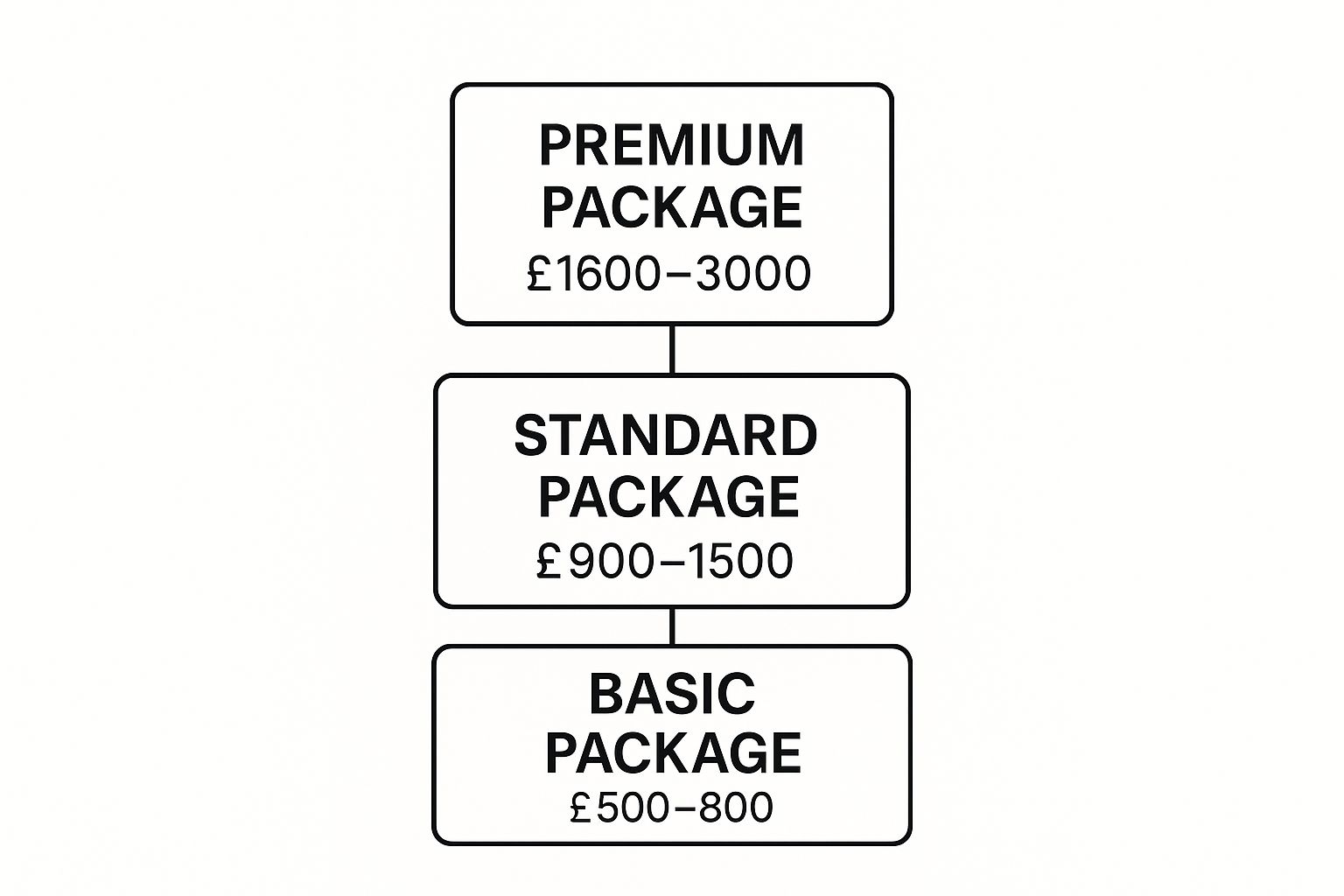If you're wondering what it costs to hire a private investigator in the UK, you’ll find that prices aren't one-size-fits-all. Generally, you can expect to pay somewhere between £30 and £85 per hour. The good news is that most professional agencies will sit down with you for a free initial chat to understand your needs and give you a clear, tailored quote.
Your Quick Guide to UK Private Investigator Costs

Figuring out the price of an investigation isn’t like picking an item off a shelf. It’s more like commissioning a bespoke suit; the final cost depends entirely on the materials, complexity, and the time it takes to get the job done right.
A simple task, like a basic address lookup, might have a fixed, predictable fee. But most cases are unique puzzles that demand a customised approach. This guide will give you a transparent look at the typical costs involved, helping you set a realistic budget.
To give you a clearer picture, let's start with a quick overview of what you can expect to pay for various services.
Typical Private Investigator Cost at a Glance
This table breaks down some of the most common services and how they are typically priced in the UK.
| Service Type | Common Pricing Model | Typical UK Cost Range |
|---|---|---|
| Surveillance | Hourly Rate + Expenses (e.g., mileage) | £45 – £85 per hour |
| Background Checks | Fixed Fee | £200 – £600+ (depending on depth) |
| Person Tracing | Fixed Fee (often "no-find, no-fee") | £150 – £750+ |
| GPS Vehicle Tracking | Daily/Weekly Rental + Installation Fee | £200 – £400 per week |
| Bug Sweeping (TSCM) | Per Square Foot or Hourly Rate | £500 – £2,000+ |
This should give you a solid baseline, but remember these are just estimates. The specific details of your situation will always be the deciding factor.
What Is the Average Hourly Rate?
Across the UK, the cost to hire a private investigator generally falls between £30 and £85 per hour. Most seasoned professionals tend to charge around the £50 to £55 mark.
It’s standard practice for reputable agencies to offer a free, confidential consultation. This is your chance to discuss your budget and for them to provide a transparent cost estimate. For a more detailed look, it's always worth exploring the pricing pages of established agencies.
It's a common myth that hiring a private investigator is unaffordably expensive. In reality, many services are priced very reasonably, especially when you weigh them against the potential cost—both financial and emotional—of leaving a serious issue unresolved.
Understanding the Initial Investment
For more complex investigations, most experienced PIs will request an upfront payment or retainer before they start. Think of this less as just a fee and more as a commitment. It secures their time and covers initial operational costs, ensuring your case gets the immediate attention it deserves.
Here are a few key things to keep in mind about your investment:
- Consultations Are Your Best Friend: Always take advantage of the free consultation. It's the perfect, no-obligation opportunity to lay out your case and get a clear quote.
- Clarity Equals Value: A truly professional agency will give you a clear, itemised breakdown of potential costs. You should never be left guessing what you're paying for.
- You're Paying for Expertise: Remember, the price reflects years of experience, a commitment to discretion, and the skill to gather information legally and effectively.
How Investigators Charge for Their Services

When you first start looking into the cost of hiring a private investigator in the UK, you’ll quickly realise there’s no single, one-size-fits-all price tag. Instead, investigators use a few different ways to bill for their time and expertise, with each method fitting certain types of cases. Getting your head around these models is the first step to setting a realistic budget.
The three main ways you'll be charged are hourly rates, fixed fees, or via a retainer. Each one is designed for a different purpose, giving you either the flexibility needed for an unpredictable job or the cost certainty for a task with a clear endpoint.
It’s a bit like hiring a builder. You’d expect an hourly rate for a tricky repair where they don't know what they'll find, but you’d want a fixed quote to build a straightforward garden wall. The world of private investigation works on a very similar principle.
The Classic Hourly Rate
This is the most common way investigators charge, especially for jobs where the timeline is a total unknown. Surveillance is the perfect example. The investigator has no way of knowing if they’ll need to watch a subject for four hours or forty to gather the evidence you need.
In the UK, you can expect hourly rates to fall somewhere between £45 and £85. The exact figure will depend on the investigator's experience and how complex the case is. This model is incredibly flexible, but it’s vital to have a frank conversation about your budget from the start to make sure there are no nasty surprises down the line.
The All-in-One Fixed Fee
For jobs with a clear beginning, middle, and end, a fixed fee is often the best way to go. It gives you complete certainty on the final cost before any work begins, which makes budgeting a whole lot easier. You simply agree on a price for a specific task, and that's what you pay.
This is the go-to pricing for services like:
- Standard Background Checks: Confirming someone's employment history or credentials.
- Document Retrieval: Sourcing a specific public record, like a birth certificate.
- Simple Person Tracing: Finding someone when you already have a good amount of information to start with (often offered on a "no-find, no-fee" basis).
This approach takes all the guesswork out of the equation. The price you see is the price you pay.
A fixed fee is ideal when the job is predictable. It ties the cost directly to the result, offering peace of mind and removing any worry about spiralling hourly costs.
Securing Time with a Retainer
For more involved or long-running cases, an investigator will often ask for a retainer. Think of it as a down payment that books their time and covers any initial costs. It’s standard practice for things like long-term corporate fraud investigations or particularly messy matrimonial cases that might drag on.
The retainer is held in a separate account, and the investigator deducts their hourly fees and expenses from it as they go. If there’s any money left over when the case concludes, it’s returned to you. This system ensures the investigator is committed to your case and can get started straight away.
Key Factors That Influence Your Final Bill
So, what separates a simple £500 job from a complex £5,000 operation? It always comes down to the details. The final cost to hire a private investigator in the UK isn't just a number pulled out of thin air; it’s a direct reflection of the resources, skill, and time needed to get you the answers you’re looking for. Getting a handle on these variables is the first step to setting a realistic budget.
The biggest driver, by far, is case complexity. A straightforward address search for someone you already know is a world away from unravelling a multi-layered corporate fraud case that involves digital forensics and covert surveillance. The more intricate the puzzle, the more hours and specialist expertise are required, which naturally pushes the price up.
This complexity really sets the tone for everything else. A simple case might just need one investigator for a few hours. But a more demanding one could require a team of two or three agents working in shifts, ensuring continuous observation without raising suspicion.
The Scope and Nature of the Work
The specific tasks involved play a huge role in shaping the final bill. For instance, surveillance jobs, where the duration can be unpredictable, are often charged by the hour, with rates typically ranging from £50 to £120 per hour. On the other hand, for well-defined tasks like background checks, you’ll often find flat fees starting around £150, which can go north of £1,500 depending on how deep the dive is. For more involved corporate cases, you might be looking at an initial payment of anywhere between £1,000 to £4,000 just to get the ball rolling.
Several other elements also have a significant say in the final cost:
- Geographic Location: Operating in central London is just more expensive than working in a quiet rural town. Higher costs for travel, parking, and other general expenses all get factored in.
- Level of Risk: High-stakes assignments, like those involving potentially volatile individuals or corporate espionage, demand highly experienced investigators and, as you'd expect, command higher fees.
- Specialised Equipment: Does the case need some serious tech? Using professional-grade GPS trackers, forensic software for data recovery, or specialised audio equipment will all be reflected in the quote.
Experience and Agency Reputation
An investigator's experience is a massive cost factor. A seasoned professional with a decade of successful cases and specialist training will naturally charge more than someone new to the field. You're not just paying for their time; you're paying for their hard-won knowledge, their network of contacts, and their ability to navigate tricky situations efficiently and legally.
Think of it like hiring a solicitor. An experienced barrister commands a higher fee because their expertise can be the difference between winning and losing a case. In the same way, a top-tier investigator's skill can ensure you get conclusive, legally admissible evidence.
Ultimately, the range of what an investigator can do is vast. To get a better idea of the possibilities and how they might affect your case's complexity, have a look at our detailed guide on what a private investigator can legally do.
To simplify things, many agencies offer tiered packages for common services. This helps give you a clearer picture of the cost structure right from the start. The infographic below shows a great example of how these fixed-fee packages often scale with the complexity of the job.

This kind of hierarchy makes it clear: as the investigation's demands grow, so does the investment needed to cover the extra resources and expertise.
Seeing the Costs in Action: Real-World Examples
Talking about hourly rates and fixed fees is one thing, but what does it actually look like when you hire a private investigator? The best way to get a feel for the real cost is to walk through a few common situations.
These examples should give you a clearer picture of how the service you need, the pricing model, and any extra expenses all come together to determine the final bill.
Scenario One: Finding an Old Friend
Let's start with a classic. You want to find an old friend from university you lost touch with years ago. All you have is their old name and maybe a last known town. This is a straightforward 'Person Trace' investigation, and it’s almost always offered on a fixed-fee basis.
An investigator will tap into specialised databases and public records to track them down. Because the steps are fairly predictable, agencies can confidently give you a single, upfront price.
- Service Type: Standard Person Trace
- Pricing Model: Fixed Fee
- Estimated Cost: £150 – £400
This fee usually gets you the search itself and a report with the confirmed details. Many reputable firms even offer this on a "no-find, no-fee" basis, so you're not out of pocket if they can't locate the person.
Scenario Two: Suspicions of Infidelity
Now for a more sensitive and dynamic case. You’re worried your partner might be cheating and need solid proof one way or the other. This job calls for discreet surveillance, which is almost always billed by the hour.
Imagine you and the investigator agree on 20 hours of surveillance, perhaps split across a Friday and Saturday. The investigator will keep a detailed log of their time, and you'll also cover expenses like petrol. If you're considering this path, our guide on hiring a private investigator for infidelity has a lot more detail on how it works.
- Service Type: Matrimonial Surveillance
- Pricing Model: Hourly Rate + Expenses
- Estimated Cost Breakdown:
- 20 Hours Surveillance @ £55/hour = £1,100
- Mileage (e.g., 100 miles @ £0.50/mile) = £50
- Report and Evidence Preparation = £100
- Potential Total Cost: £1,250
This is exactly why it's so important to talk about budget with hourly work. Setting a cost ceiling or arranging for daily updates ensures there are no nasty surprises when the invoice arrives.
Scenario Three: A Complex Corporate Search
Finally, a corporate example. A business is heading into a legal battle and needs to understand the financial strength of its opponent. They need a deep-dive asset search to uncover property, other company directorships, and hidden financial interests.
This is highly specialised work. While a simple debtor trace might only cost £75, a complex 'Level 3' asset search for litigation can be much more. A price tag of around £550 plus VAT isn't uncommon, as it involves digging into sophisticated financial data and requires serious analytical skill. You can learn more about these kinds of investigative service costs on Tremark.co.uk.
- Service Type: Corporate Asset Search
- Pricing Model: Fixed Fee
- Estimated Cost: £500 – £1,500+
The price here can vary wildly depending on how deep the search needs to go and whether it involves assets held overseas.
To bring it all together, here’s a table summarising how these different investigations might be costed.
Estimated Costs for Common UK Investigations
This table provides a snapshot of how different services, pricing models, and time commitments can influence the final cost of hiring a private investigator in the UK.
| Investigation Scenario | Primary Service | Estimated Cost Breakdown | Potential Total Cost |
|---|---|---|---|
| Locating a Missing Person | Standard Person Trace | Fixed fee for database and public record search. | £150 – £400 |
| Suspected Infidelity (Weekend) | Matrimonial Surveillance | 20 hours of surveillance @ £55/hr + £50 expenses. | ~£1,250 |
| Corporate Due Diligence | Comprehensive Asset Search | Fixed fee based on complexity, from basic to international. | £500 – £1,500+ |
| GPS Vehicle Tracking | Covert Device Installation & Monitoring | £250 installation fee + £250 weekly monitoring fee. | £500 (for 1 week) |
As you can see, the costs are directly tied to the nature of the work. A predictable desk-based search costs far less than a dynamic, on-the-ground surveillance operation.
Budgeting for Expenses Beyond the Hourly Rate

It’s easy to focus on the headline rate when you’re looking to hire a private investigator, but that’s often just one part of the story. The hourly or fixed fee pays for the investigator’s time and expertise, but it rarely covers the actual running costs of an investigation.
Think of it like hiring a builder. The quote covers their labour, but you still need to budget for the materials – the bricks, cement, and timber. In an investigation, these "materials" are the operational expenses, often called disbursements, that are essential to getting you the answers you need. A good agency will be upfront about these, but knowing what to expect helps you build a realistic budget and avoid any nasty surprises down the line.
Common Additional Expenses
So, what kind of extra costs are we talking about? Most are just the practical, day-to-day expenditures needed to conduct the work, whether it’s out in the field or from behind a desk.
Here are some of the most common charges you’ll likely see on an invoice:
- Mileage: If an investigator is on the move for surveillance or to follow up a lead, you can expect a mileage charge. This is typically between £0.45 and £0.55 per mile.
- Travel and Parking: For cases in busy city centres like London or Birmingham, things like train fares, the Congestion Charge, and unavoidable parking fees will be added to the bill.
- Database Search Fees: Investigators have access to powerful, professional-grade databases that the general public can’t use. There’s a cost to access this information, which is usually passed on to the client.
- Report Generation: Putting together all the evidence, editing video footage, and writing a comprehensive final report takes time. Some agencies will charge a separate administrative fee for this crucial final step.
A transparent quote should always explain how expenses are handled. If it's vague or missing, that’s a red flag. Always insist on a full breakdown of potential costs beyond the main fee so you have a complete financial picture from the outset.
Clarifying Costs During Your Consultation
The best time to get a handle on all potential expenses is during your initial consultation. This is your opportunity to ask direct questions, get clear answers, and make sure you can compare quotes from different agencies on a like-for-like basis.
Before you commit to anything, be sure to ask:
- What is your mileage rate? This is a frequent and variable cost, so it’s good to know the exact figure.
- Are administrative costs included? Find out if things like report writing and phone calls are built into the hourly rate or billed as extras.
- Will there be fees for database searches? This is particularly important for tracing cases. For more background on this, have a look at our guide on tracing telephone numbers in the UK.
- What happens if a court appearance is required? It pays to know the investigator's daily rate for attending court well in advance.
Asking these simple questions puts you in control of your budget and helps build a relationship based on trust. Any reputable professional will appreciate your diligence and be happy to explain exactly where your money is going, every step of the way.
How to Get a Quote You Can Trust
Getting a quote for an investigation is a big step, and you need to know it's both fair and transparent. This part of the process is a lot like finding a qualified professional in any other field – a bit of homework now saves a world of trouble later.
Your first chat with the investigator is crucial. To get a truly accurate quote, you need to be an open book. The more detail you can give them about your situation, the better they can gauge the time, resources, and potential snags involved.
What a Good Contract Should Look Like
A professional quote isn't just a number on a piece of paper; it's the roadmap for the entire investigation. It should be a clear, detailed document that leaves no room for confusion.
Make sure you can tick off these key items:
- A Clear Scope of Work: It must spell out exactly what the objectives are and the specific actions the investigator will take to meet them.
- A Detailed Fee Breakdown: Whether it's an hourly rate, a flat fee, or a retainer, you need to see exactly how the costs are calculated.
- A Policy on Extra Expenses: The contract should clearly state how they handle additional costs like mileage, travel, or special database access fees.
The cheapest quote is rarely the best deal. Real value lies in an investigator's experience, professionalism, and their ability to deliver results that stand up in court. A bargain-basement price from a novice could end up costing you far more if the work is done poorly or the evidence is unusable.
Finally, always do your due diligence. Check their credentials, look for independent reviews, and trust your gut. When you're considering the hire a private investigator UK cost, remember you're not just buying time; you're paying for expertise and peace of mind.
For a more detailed checklist, our guide on how to hire a private detective breaks down every step.
Frequently Asked Questions About Investigator Costs
It's completely normal to have a few more questions rattling around, even after looking at the numbers. When you're thinking about the hire a private investigator uk cost, a few common queries always pop up. Let's get them answered so you can move forward with confidence.
Is It Cheaper to Hire a Freelancer or an Agency?
This is a classic question, and the answer isn't just about the price tag—it’s about what you actually need. At first glance, a freelance investigator often looks cheaper. They have lower overheads, so their hourly rate might be more attractive.
But an agency brings a whole different level of resources. You get a team, a broader range of skills, and access to more sophisticated equipment. Think of it this way: for a straightforward, local job like finding an old address, a good freelancer is often the perfect, cost-effective choice. However, if you're looking at a complex surveillance job that needs several agents or a deep corporate investigation, an agency's backup and manpower are essential and well worth the investment.
Whatever you decide, make sure they're legitimate. Reputable professionals are usually members of recognised UK professional bodies for investigators.
Do I Have to Pay the Entire Fee Upfront?
Not usually, no. For any significant investigation, it's very rare to be asked for the full estimated cost before the work has even started. The industry standard is to ask for a retainer.
A retainer is essentially a deposit. It secures the investigator's time for your case, covers their initial setup costs, and lets them get started right away. As the hours are worked and expenses are incurred, they are simply billed against that initial retainer.
Does the Fee Guarantee a Specific Outcome?
This is a really important one to get your head around. No, it doesn't. You are paying for a professional's time, their expertise, and the process of the investigation itself—not for a specific result.
A reputable investigator will never promise they'll find proof of an affair or unearth a particular secret. Their promise is to conduct a meticulous, legal, and discreet investigation to find the truth, whatever that turns out to be. The fee pays for their professional effort, not a pre-packaged conclusion.
When you need clear, reliable answers, you need a team with proven experience. Contact UK Private Investigators for a confidential, no-obligation consultation to discuss your needs and receive a transparent quote. Get the clarity you deserve by visiting https://www.ukprivateinvestigators.com today.

